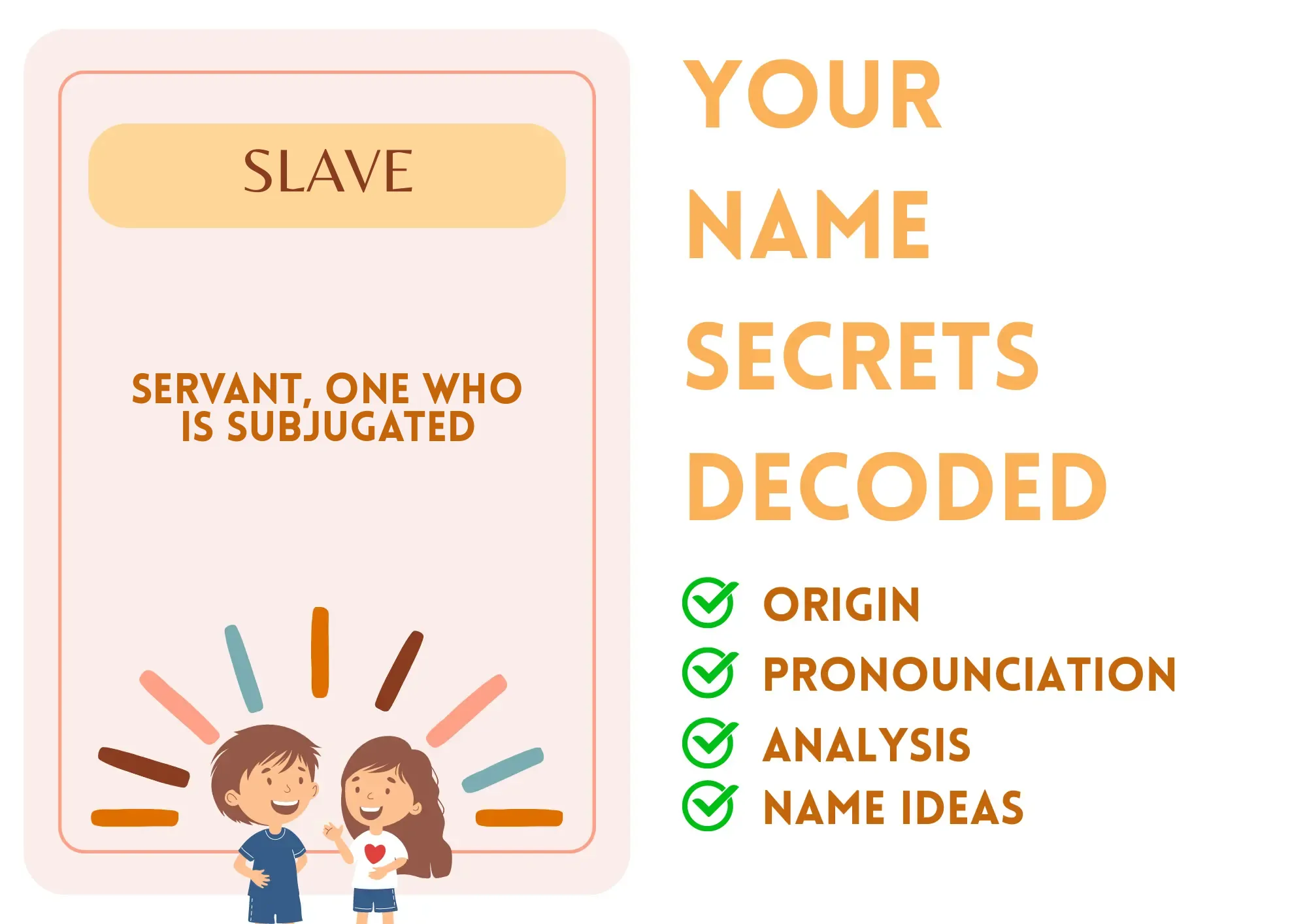
Slave
Slave is a term that has deep historical and cultural significance, generally referring to a person who is the legal property of another and is forced to obey them. Traditionally, it has negative connotations associated with oppression and loss of freedom. This stark meaning makes it a peculiar choice for use as a name, which is often discouraged due to its association with suffering and servitude.
As a name, Slave is rarely used in contemporary contexts, mainly due to its heavy and dark implications. It evokes feelings of empathy and historical awareness, and most people would find it uncomfortable as a personal name.
Being a single syllable name, it is straightforward to say but carries significant emotional weight, leading to potential misunderstandings and negative perceptions.
Basic Information
Gender: Unisex
Sounds Like: slayv
Pronunciation Explanation: The name is pronounced as 'slayv', rhyming with 'brave'.
Summary and Meaning
Meaning: servant, one who is subjugated
Origin: The term has roots in the Latin word 'sclavus', referring to a person in servitude.
Usage: While 'Slave' can technically be used for any gender, it is not commonly adopted as a name for any.
Name Number (Chaldean)
Name Number (Pythagorean)
Popularity (Global Rank)
Overall: 64093
Boys: 45944
Girls:
Most Popular in
Religious and Cultural Significance
Religion: Christian
Background: In religious texts, the concept of servitude is addressed, sometimes in metaphorical contexts, but the term 'slave' itself is rarely revered.
Cultural Significance: Culturally, the term carries significant weight due to historical slavery practices and movements for freedom and rights.
Historical Significance: Throughout history, the concept of slavery has been a major part of many cultures and societies, highlighting issues of human rights and social justice.
Popular Culture
Literature and Mythology: The term Slave appears in many historical texts and literature, often in contexts discussing morality, ethics, and human rights.
Movies and Television: Some cinematic works depict characters in the context of slavery, showcasing the harsh realities of human subjugation.
Feelings and Perceptions
Perception: The name Slave is predominantly viewed negatively due to the association with oppression and suffering. It is generally avoided in naming conventions.
Positive Feelings: N/A
Negative Feelings: Oppressive, uncomfortable, historical burden, painful connotations.
Practical Considerations
Ease of Writing and Calling: As a single syllable name, Slave is easy to write and pronounce, but its implications can lead to discomfort.
Common Typos and Misspellings: Slav,Slavve,Slayve
Common Nicknames: N/A
Slave Popularity
Slave Usage and Popularity By Country
| Country | Rank (Overall) |
|---|---|
| Montenegro | 1785 |
| Slovenia | 2013 |
| Serbia | 2276 |
| Croatia | 2907 |
| Bulgaria | 3701 |
| Gabon | 4685 |
| Syria | 5814 |
| Romania | 7225 |
| Vietnam | 10474 |
| Sweden | 10934 |
Slave Usage and Popularity By City
| City | Rank (Overall) |
|---|---|
| London | 22189 |
| New York | 32506 |
| Willowbrook | 208 |
| Paris | 29424 |
| Chicago | 26948 |
| Calgary | 10557 |
| Melbourne | 23253 |
| Rochester | 5924 |
| Sao Paulo | 30454 |
Compatibility Analysis
Famous Persons Named Slave
Related Names
Similar Sounding Names:
Slay,Slate,Salve

